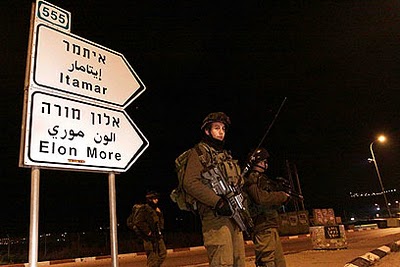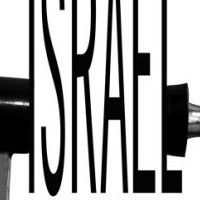![]()
Mon, March 14, 2011 | The Rubin Report | By Barry Rubin

Security forces set out in search of the palestinian terrorist(s) who stabbed to death five members of the Fogel family in the Jewish village of Itamar in northern Samaria.
Why Palestinian Terror Attacks Ensure There Will Be No Peace
Events like the massacre of an Israeli family by terrorists aren’t just tragedies or crimes, they are events of huge political and international importance. They reveal issues and stories that Western governments and media refuse to understand yet which foil their plans and contradict their assumptions.
While the Itamar massacre of the Fogel family — an Israeli couple and three of their young children — is only one in a long chain of such terrorist attacks and murders, it points to a major issues that U.S. policy has never addressed and which poses as much — and arguably more — threat to the possibility of peace than do settlements. That issue is incitement.
The main political impact of terrorist attacks is not on Israeli but rather on Palestinians. Inciting beforehand and justifying — even celebrating — afterward has far less effect on hardening Israeli attitudes than on ensuring that the Palestinian political atmosphere remains extremist and the Palestinian Authority’s (PA) policies on any real chance for a peace agreement remain hard line.
To put it a different way, if the day after a horrendous terrorist attack the PA offered a real and credible comprehensive peace deal, Israel would still accept it. But the political culture of terrorism makes it certain that the PA will do no such thing and ensures that such a peace is — to put it in the most optimistic possible terms — at least a generation away.
During the 1990s’ peace process, the PA sometimes acted to stop attacks and to punish the perpetrators afterward minimally, temporarily, and more for their inconvenient timing than for their crime. Yet it continued to promote the culture of martyrdom and blind hatred that promoted terrorism. Thus, the process of war by terrorism was easily restarted when Arafat wanted to do so in 2000.
Then and since then, day in and day out, the PA’s official media — television, radio, and newspaper (al-Hayat al-Jadida) — and schools incite violence against Israel; glorify terrorists as heroes and role models who will also receive great heavenly rewards; portray Israelis as monsters; and teach Palestinians that Israel has no right to exist and should be wiped off the map.
The PA’s summer camp is named after a terrorist. Just last week, a football tournament was announced named in honor of a suicide bomber. Last year a major square in Ramallah, the PA’s capital, was renamed to honor another terrorist. Mahmoud Abbas extolled a band that called for war on Israelis. The PA’s minister of religion states that Allah commands that Muslims rule the entire land and eliminate Israel. Is there some pattern here, perhaps a phenomenon worthy of a little international attention, a story meriting some reporting?
In this latest case, there was an especially pointed example: just three weeks before this latest attack Palestinian Authority television showed a program celebrating the terrorist who murdered three Israeli civilians in the same town nine years ago.
And as if all this were not enough, the day after — let me repeat that — the day after the killing of the Fogel family, the PA renamed a square in the town of el-Bireh after a terrorist who murdered Israeli civilians. It is conceivable — fully conceivable — that if one day the murderers of the Fogel family will be honored by the PA.
There is no such situation on the Israeli side save for extraordinarily marginal extremists who receive no social sanction and often face real punishment. Any attempt to portray the two sides as equivalent in this respect is a flat and conscious lie.
As for the PA leadership, what we see over and over again is a showy but routine denunciation of terrorism in English for the international audience coupled with encouragement to commit terrorism in Arabic to the Palestinian audience. It is easy to demonstrate that this is the actual situation. Yet the Western news media almost totally ignore this issue.
Thus, even the naming of squares, sporting events, and institutions by the Palestinian Authority after specific terrorists who murdered Israeli civilians draws no major U.S. government criticism (much less pressure or punishment) or media coverage.
The U.S. State Department has already issued a statement criticizing an Israeli government decision, in response to the massacre, to build a couple of hundred more apartments on the West Bank. State Department spokesman Mark Toner said the plan “runs counter to efforts to resume direct negotiations.” Why doesn’t what the PA does every day sabotage negotiations and progress? And incidentally, the PA refuses to talk even when Israel does freeze construction. They aren’t rejecting negotiations because of settlements; they are rejecting negotiations because they don’t want to negotiate.
Yet there is no real criticism or pressure over incitement. If you want to understand why there is no peace now or hope for it in the forseeable future, the U.S. government’s failure to deal with this issue — or condition aid and support for the PA on some change — is a large part of the answer.
It is not only that the terrorist violence makes Israel and Israelis mistrustful of the Palestinian Authority and about making more concessions, when those in the past have cost so many lives of Israeli civilians. In addition, the incitement and even celebration of terrorist acts creates a Palestinian public opinion favoring endless conflict and demanding total victory; elevates the gunmen and their supporters to real power in Palestinian politics (“President” Mahmoud Abbas and Prime Minister Salam Fayyad are largely front men kept their to keep foreign donors happy); and persuade Palestinians that compromise is equivalent to treason.
When Western governments denounce Palestinian terrorist acts in the same terms they decry an earthquake in Japan or a tsunami in Thailand they miss the point. These are not just regrettable events but arise from Palestinian — either Palestinian Authority or Hamas — decisions. The key question is not whether Israeli police can prove a case in court but the atmosphere that produces a Palestinian cult and strategy of terrorism that has lasted decades.
The real cycle of violence isn’t that settlements create terrorism, or between Israeli violence and terrorism, but rather the relationship between Palestinian incitement and terrorism. Incitement itself is built on the idea that terrorism mobilizes public approval, demoralize the enemy, and is justified morally.
This is not some sideshow or minor issue but is at the very core of the problem. Incidentally, the same basic points apply to revolutionary Islamism. The Egyptian Muslim Brotherhood has not “renounced” violence. It glorifies, extolls, and encourages violence, portraying its enemies as subhumans who the deity wants killed. At a given moment — like the PA — it might not implement violence but the justifications have been made and its followers are ready to murder when the signal is given.
As for the Israel-Palestinian conflict, until this issue is addressed — and there is no current sign that it ever will be — there won’t be any diplomatic progress. Regarding the wider regional battle for control of Arabic-speaking countries, the revolutionary Islamists believe they are just getting started.
PS: After publishing this article I found an index of incitement issued after the Itamar attack here.
About the author,
Barry Rubin is Director of the Global Research in International Affairs (GLORIA) Center and editor of the Middle East Review of International Affairs (MERIA) Journal. His books include Islamic Fundamentalists in Egyptian Politics and The Muslim Brotherhood (Palgrave-Macmillan); and The Long War for Freedom: The Arab Struggle for Democracy in the Middle East, a study of Arab reform movements (Wiley). GLORIA Center site: http://www.gloria-center.org His blog, Rubin Reports, http://www.rubinreports.blogspot.com/.



 RSS
RSS











Why #Palestinian #Terror Attacks Ensure There Will Be No #Peace | #Israel http://j.mp/feQYAp
RT @CrethiPlethi: Why #Palestinian #Terror Attacks Ensure There Will Be No #Peace | #Israel http://j.mp/feQYAp